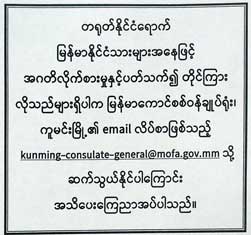The Five Principles of Peaceful Co-Existence
7. In 1954 Myanmar, China and India, during Chinese Premier Chou En Lai’s visit to India and Myanmar expounded the Five Principles of Peaceful Co-existence. Accordingly, on 28.6.1954 China and India signed in New Delhi and on 29.6.1954 Myanmar and China signed in Yangon, agreements to adhere to these Five Principles of Peaceful Co-existence. The Five Principles of Peaceful Co-existence are:
• mutual respect for each other’s territorial integrity and sovereignty;
• to abide by mutual non-agression;
• non-interference in each other’s internal affairs;
• respect for mutual equality and to work for mutual benefit; and
• peaceful co-existence
The above Five Principles of Peaceful Co-existence still steadfastly remain the main cornerstone of Myanmar Foreign Policy.
8. In matters of world affairs and international issues, in line with the principles and purposes of the United Nations and on the basis of the principles of Peaceful Co-existence, Myanmar has acted as follows;
• actively participating in United Nations activities in accordance with its own basic principle;• consistently supporting disarmament;
• opposing arms race, production and sales;
• supporting national liberation movements;
• supporting decolonialization;
• opposing aggression of imperialists;
• opposing colonialism, apartheid and racial discrimination;
• supporting efforts to ensure world peace; and
• opposing aggressive imperialistic wars.
အဂတိလိုက်စားမှုများ တိုင်ကြားရန်

